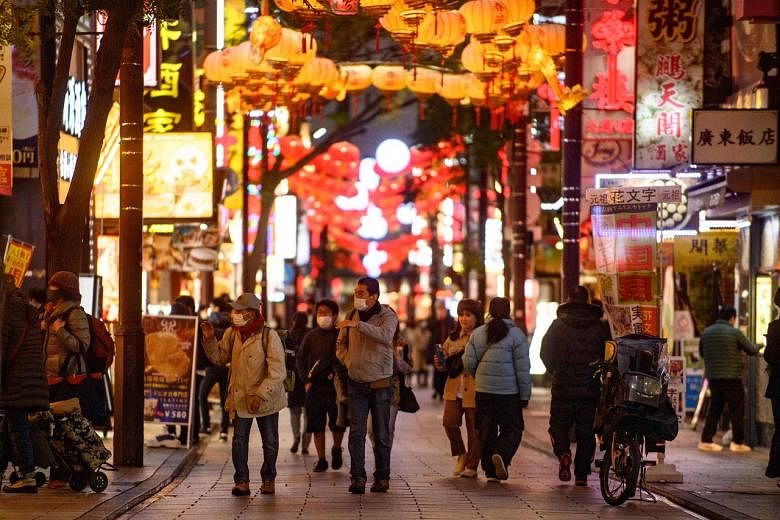TOKYO - The Japanese government on Tuesday (Dec 8) rubbished a scientific study from the country's top university that blamed its much-vaunted Go To Travel domestic tourism campaign for the country's unfurling third wave of Covid-19 infections.
The study by a team of researchers from the University of Tokyo and other institutions in Kanagawa and Osaka is the first to conclusively draw a direct link, arguing that those who used the campaign were twice as likely to exhibit Covid-19 symptoms.
This will likely add further pressure on Prime Minister Yoshihide Suga, who has long insisted that the Go To Travel campaign should not be made a scapegoat for the resurgence in infections and that there has not been any scientific evidence the campaign is to blame.
Mr Suga's Cabinet approval ratings tumbled in three media polls last weekend, with a majority of respondents negatively rating his government's response to the Covid-19 resurgence.
The clash between politics and academia erupted on the very same day the Japanese government approved its third stimulus package worth 73.6 trillion yen (S$945 billion). The sum includes an additional budget of 1.35 trillion yen to fund an extension of the Go To Travel scheme to June 2021 from the original end date of January.
Economy minister Yasutoshi Nishimura, Japan's point man for Covid-19 strategy, said on Tuesday that the study was "inconclusive", as it was not peer-reviewed.
Poking holes into the research study, which he said should be dismissed, as it was clearly flawed, he noted that the 28,000 respondents, aged between 15 and 79, had not taken polymerase chain reaction (PCR) tests.
Rather, he argued that they were merely asked if they had exhibited any Covid-19 symptoms - including fever, headache, sore throat, cough, and a loss of sense of taste and smell.
"Exhibiting Covid-19 symptoms clearly does not mean that one is necessarily infected with the coronavirus," he said. "This is an important point. They only asked about symptoms."
In the study conducted from Aug 25 to Sept 30, the researchers asked respondents if they had taken part in the Go To Travel campaign, and whether they had exhibited symptoms.
It concluded that those who had made use of the domestic tourism campaign were as much as twice as likely to exhibit Covid-19 symptoms than those who did not.
"The users of government subsidies for domestic travel experienced a higher incidence of symptoms indicative of the Covid-19 infection," the study said.
It further stressed that self-reported Covid-19-like symptoms, especially the loss of sense of smell and taste, served as a good proxy. It said: "PCR testing will underestimate the true number of infections because not everyone with symptoms indicative of Covid-19 is tested."
Chief Cabinet Secretary Katsunobu Kato told a regular news conference on Tuesday that he would refrain from commenting on the results of individual studies. He added: "The government will consult its panel of experts and coordinate its responses properly."
But even the leader of the government's coronavirus advisory sub-committee, Dr Shigeru Omi, has said to little effect: "It is crucial that we reduce the movement of and contact among people in an intensive manner in a short period of time."
The Go To Travel campaign provides hefty discounts to users, of up to 20,000 yen per overnight stay, and has been credited for breathing new life into the hospitality industry.
The scheme was masterminded by Mr Suga when he was top government spokesman under his predecessor Shinzo Abe.
Mr Suga has been reluctant to back down on the initiative, even as political pressure forced him to make an abrupt U-turn and temporarily halt the scheme in the hardest-hit cities of Osaka and Sapporo, and advise elderly users from Tokyo to not use the programme.
How effective the partial suspension will be remains to be seen.
Osaka and Hokkaido, facing a dire shortage of nurses, asked for back-up from military medics of the Self-Defence Forces on Monday.

Tokyo recorded 352 new Covid-19 cases on Tuesday, in what was its second-highest tally for a Tuesday thus far. The caseload in the Japanese capital fluctuates greatly and is typically low at the start of the week due to fewer cases being confirmed over the weekend.
But Saitama, north of Tokyo, registered an all-time high of 172 new cases, as did the popular tourist attraction of Kyoto, which logged a new high of 63 cases. Crowds had thronged the Kiyomizu-dera Temple, a Unesco World Heritage site, for its autumn night illumination event last month, with no social distancing measures in place.
The Mainichi daily said in an editorial on Tuesday that the extension of the Go To Travel campaign was an "overly eager move" that risked sending the wrong message.
"The tourism industry needs aid, but there must be a way to support the industry by promoting trips to and from limited locations," it said. "What is being asked of the government right now is that they methodically analyse the state of infections and apply the brakes when appropriate."
Elsewhere, the Yomiuri daily also sounded the alarm over the surge in severely ill Covid-19 patients, which more than doubled in three weeks to hit a new high of 536 on Tuesday.
Noting that hospitals that responded to the pandemic are "facing deteriorating business conditions and seeing a rash of resignations from nurses and other staff", the newspaper said: "It is vital to establish a system as soon as possible to prevent a situation in which lives that could have been saved are lost."












